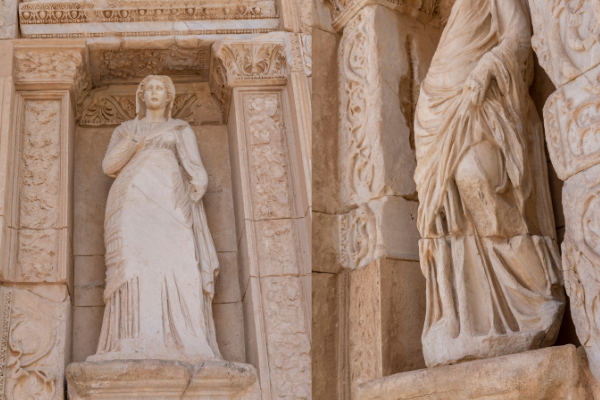
Ephesus
Ephesus: A Convergence of History and Spirituality
Ephesus, located near the town of Selçuk in İzmir Province of modern-day Turkey, is recognized as one of the most significant archaeological sites in the world. Founded by Greek colonists in the 10th century BC, this city emerged as a major cultural and commercial center in the Anatolian region during the Roman Empire. By the 1st century BC, its population had surpassed 250,000, making it the second-largest city in the world at that time.
Ephesus was renowned for the Temple of Artemis, considered one of the Seven Wonders of the Ancient World. Unfortunately, the temple was destroyed in 401 AD, leaving only its foundations and a single column as reminders of its former glory. This temple underscores the city’s significance not only in political and economic terms but also as a vital center for early Christianity. The Apostle Paul lived in Ephesus, and his letters to the Ephesians in the New Testament underscore the city’s role in the spread of Christianity.
Among Ephesus’s most striking ruins is the Library of Celsus, a magnificent example of Roman public architecture that once housed more than 12,000 scrolls, ranking it among the largest libraries of the ancient world. The Grand Theatre of Ephesus, capable of seating 25,000 spectators, illustrates the city’s cultural and social life. It is said that it was in this theater that Paul preached against paganism, leading to a riot by silversmiths who were threatened by the spread of Christianity.
The Terrace Houses provide insights into the daily lives and domestic architecture of Ephesus’s affluent residents. These houses, adorned with beautiful mosaics and frescoes, featured advanced amenities such as heating and running water.
Other notable sites include the Marble Road, the Arcadian Way, and the Agora, showcasing the city’s infrastructure and its role as a commercial hub. The Temple of Hadrian, with its intricately carved facade depicting scenes from Ephesian mythology and history, stands out as another must-see.
Ephesus also holds a significant place in Christian tradition as the final resting place of the Virgin Mary. The House of the Virgin Mary, a small chapel on the outskirts of the city, is believed by many to be where Mary spent her last days, now a popular pilgrimage site for Christians worldwide.
Today, Ephesus is listed as a UNESCO World Heritage Site, drawing millions of tourists and scholars to explore its ancient streets, temples, and theaters. Ongoing archaeological excavations continue to add new layers to our understanding of ancient civilizations. Ephesus serves as a bridge between the past and present, offering an intriguing glimpse into the complexities of ancient urban life and the cultural and religious dynamics that shaped the Roman Empire. Through its enduring relics and stories, Ephesus invites us into a world where history and spirituality converge, offering a unique perspective on humanity’s enduring quest for meaning and connection.
Expanding on Ephesus’s significance, it’s essential to highlight its role in the ancient economy. Ephesus was a vital trade center due to its strategic location near the coast and its accessibility to the River Cayster. The city’s harbor, though silted up over time, was once bustling with ships from across the Mediterranean, making it a crucial point for commerce and trade. Goods such as spices, silks, and other exotic merchandise from Asia Minor flowed through Ephesus, enriching the city’s economy and allowing it to flourish.
The cultural landscape of Ephesus was also vibrant and diverse. The city hosted numerous festivals and games, attracting participants and spectators from all over the region. These events, often held in the various public spaces such as the Odeon and the Stadium, not only provided entertainment but also reinforced social cohesion and civic pride among the inhabitants. The arts flourished in Ephesus, with sculptures, mosaics, and frescoes adorning public buildings and private homes alike, reflecting the city’s wealth and the importance of cultural patronage.
Ephesus was also an intellectual hub, drawing philosophers, scientists, and writers. The presence of such a large and well-stocked library as the Library of Celsus indicates the value placed on knowledge and learning. This intellectual environment contributed to the city’s dynamic and progressive character, making it a beacon of civilization in the ancient world.
The city’s decline began in the later Roman period due to a combination of factors including the silting of its harbor, which hindered trade, and several devastating earthquakes. Despite these challenges, the city’s legacy endures through the ruins that continue to captivate and educate visitors from around the globe.
Ephesus is not merely an archaeological site; it is a testament to human resilience, ingenuity, and the relentless pursuit of knowledge and spiritual understanding. Its ruins stand as silent witnesses to the ebbs and flows of human history, offering lessons and inspirations for future generations. Visiting Ephesus is not just a journey into the past but an exploration of the timeless human spirit that has shaped our present and will undoubtedly influence our future.
“Discover a myriad of tour options to suit every traveler’s preference and interest. From cultural excursions to adventurous expeditions, we offer a diverse range of tours to cater to all tastes. Whether you crave historical exploration, culinary delights, outdoor adventures, or leisurely sightseeing, we have the perfect tour for you. Browse through our selection and embark on your next unforgettable journey with us.”






